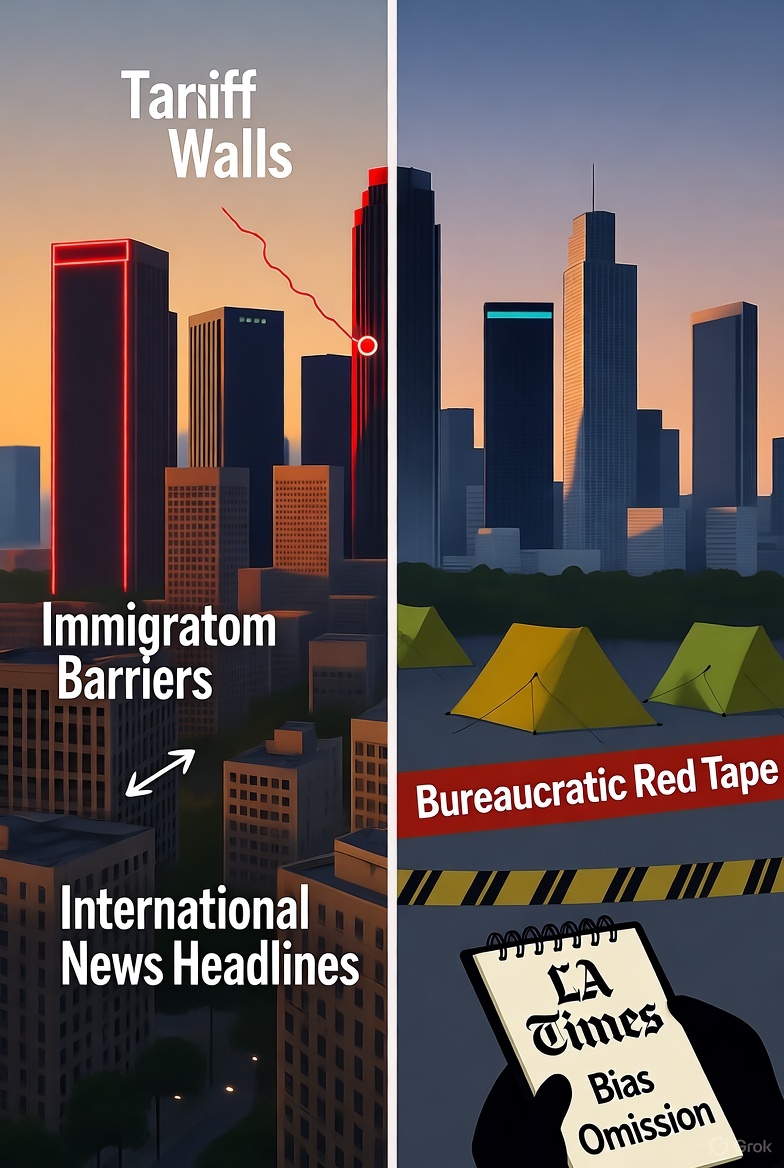In a year marked by economic strain, geopolitical tension, and domestic upheaval, tourism in California has taken a measurable hit. But when the Los Angeles Times published its recent report on declining international arrivals, it did more than document a trend—it revealed a troubling lapse in journalistic integrity.
The article, penned by Cerys Davies, attributes the downturn in Los Angeles tourism to a cascade of federal-level issues: tariffs, immigration raids, and global perceptions of U.S. border enforcement. While these factors are undeniably relevant, the piece conspicuously omits any mention of local governance, crime, homelessness, or the regulatory burdens imposed by city and state officials. This selective framing violates core tenets of the Society of Professional Journalists (SPJ) Code of Ethics, which calls on journalists to:
- Seek truth and report it
- Minimize harm
- Act independently
- Be accountable and transparent
Selective Attribution: Federal Blame, Local Silence
The article names federal actors repeatedly, blaming their rhetoric and policies for a drop in Canadian and European tourism. Yet it never mentions:
- Governor Gavin Newsom, who has supported California’s sanctuary state status and signed legislation affecting immigration enforcement and labor policy.
Governor’s tourism statement - Mayor Karen Bass, who has backed expanded protections for undocumented immigrants and supported local wage hikes for hotel workers.
- L.A. City Council, which passed ordinances mandating a $30/hour minimum wage for hotel workers by 2028—just before the Olympics.
Coverage - San Francisco Supervisors, who approved a 14% Transient Occupancy Tax (TOT) and additional tourism district fees, making it one of the most expensive cities for overnight stays.
SF Budget Office - San Diego City Council, which expanded TOT zones and supported Measure C, increasing hotel taxes near the Convention Center.
San Diego TOT Zones
These are not abstract decisions—they are policy-driven price inflators that directly affect tourism competitiveness.
Economic Pressures Ignored
The article fails to mention how local decisions have contributed to rising costs that deter tourists:
- Hotel taxes in cities like Los Angeles (14%), San Francisco (14%), and San Diego (up to 13.75%) add significant cost to nightly stays.
- Mandatory resort fees in Las Vegas and other cities can exceed $50/night.
- Minimum wage hikes in hospitality sectors drive up food and service prices, creating “sticker shock” for visitors.
- Tourism Improvement District fees in Monterey, San Luis Obispo, and other coastal towns add $1.50–$4.50 per night.
These costs are cumulative—and they’re driven by local and state policy, not federal mandates.
Intellectual Dishonesty by Omission
By omitting local governance, crime, homelessness, and regulatory burdens, the article distorts the causal landscape. It implies that tourism decline is solely the fault of federal actors, while shielding municipal and state leadership from scrutiny. This is not just lazy reporting—it’s narrative engineering.
The SPJ Code of Ethics demands that journalists “provide context” and “identify sources clearly.” This article fails both tests. It names one federal figure repeatedly while ignoring the dozens of local and state officials whose decisions shape the tourism economy daily.
Toward Honest Discourse
If California is to recover its tourism economy, it must confront the full spectrum of challenges—federal, state, and local. That requires journalism willing to ask uncomfortable questions, name responsible actors, and resist ideological gatekeeping.
Until then, readers must remain vigilant. When the press fails to follow its own ethical code, it falls to the public to demand better.
Sources
- Governor Newsom’s tourism statement
- California sanctuary policies overview
- L.A. hotel wage hike coverage
- San Francisco TOT report
- San Diego TOT zones
